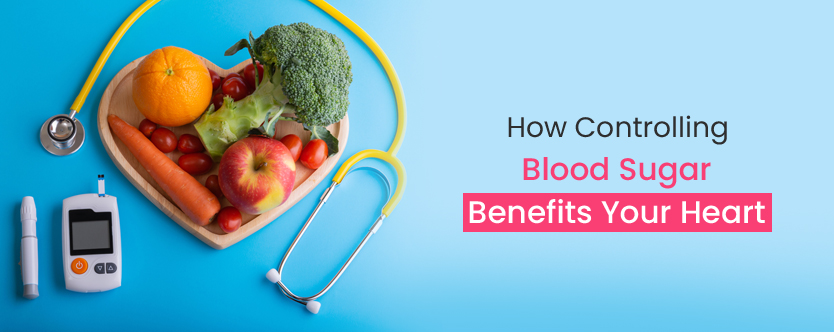
How controlling blood sugar benefits your heart?
Diabetes and heart health are interlinked as the latter can be affected by the complications borne from the first. High blood sugar levels can put one at risk of various heart conditions.
That is so because when you have uncontrolled diabetes, your body can’t absorb all of the ingested sugar properly, and the excess of it sticks to the red blood cells and builds up in your blood. As a result, vessels carrying blood to and fro from the heart get blocked and damaged, restricting the oxygen supply and nutrients into the heart and giving rise to several diseases like coronary heart disease, heart failure, and diabetic cardiomyopathy. High blood pressure & cholesterol levels or unhealthy weight are some other factors that make the condition worse.
If you have diabetes, proper management is essential to mitigate the risk of heart disease and other complications. Medications and regular checkups are one method to keep the blood sugar levels in check. Another approach is to go the natural way with your daily meals. Having a fiber-rich & low-carb diet can notably help stabilize blood sugar levels. When a diabetes diet plan and regular physical exercise are combined, they cater to all the mentioned health conditions and notably lessens the cardiovascular disease risk in people with diabetes. Brisk walking, jogging, yoga, biking, or swimming, are some exercises that help maintain ideal body weight and strengthen the heart to help it pump more efficiently and improve blood flow in the body & ensures good heart health.
Foods that can help to keep diabetes in control & heart healthy
Heart-healthy foods are the ones that help lower your risk of having heart disease by reducing blood pressure, overall cholesterol, LDL cholesterol, triglycerides, and fasting blood sugar levels. It includes foods that are:
●low in sodium, cholesterol, saturated fats, trans fats
●high in fiber, antioxidants, vitamins, and minerals
Legumes:
Rich in fiber, legumes are the best option to have in your diet. Fiber lowers blood sugar levels. Black, white & kidney beans, lentils, and dry split peas are some of the legumes known to reduce the risk of heart disease by easing your blood pressure, resting heart rate, blood lipid levels called triglycerides, and the risk of stroke.
Whole Grains
Try to incorporate whole grains into your daily diet for blood sugar. Replace regular flour chapatis with the whole ones. Or, if you crave pizza, pasta, or bread, go for whole-grain varieties as they keep the bran and germ layers intact and prevent the risk of health diseases. Besides, they are rich in Vitamin B, magnesium, and selenium. The whole grains repress the after-meal blood sugar spikes and keep you full for longer.
Flaxseeds
Flaxseeds possess quite a high capability against high blood sugar and cholesterol. These tiny-looking seeds can help prevent plaque build-up on arteries that leads to heart diseases. It lowers the bad cholesterol (LDL) & and boots good cholesterol (HDL). Grind & use flaxseeds in smoothies, chapatis, oatmeal, etc.
Leafy Greens
These are low in calories and packed with nutrients for good health. They are rich in Vitamin C, E offering protection against inflammation. Fiber helps regulate sugar levels. Try to have one or two servings of spinach, lettuce, methi leaves, and any other leafy vegetables every day to lower the risk of heart disease.
Broccoli
Broccoli is considered a superfood when it comes to blood sugar control. It consists of sulforaphane, a phytochemical that helps regulate sugar levels. Including half a bowl of it in your diabetic meal plan can help prevent plaque build-up in arteries. Cabbage, cauliflower are other options from a similar vegetable family that can offer similar benefits.
Olive Oil
Although fats have no such contribution in raising sugar levels, they can considerably affect cardiovascular health. Animal-based fat has the highest effect on cardiovascular health. Among the plant-based fats, olive oil is probably the standout in protecting the heart. Olive oil consists of polyphenol compounds that help your body better use insulin, lower blood pressure, and prevents the risk of heart disease and stroke.
Almonds & Nuts
Nuts are rich in protein, healthy fats, carbs, fiber, and essential nutrients. Out of them, almonds particularly help in steady blood sugar, cholesterol, and blood fats. They also satiate you for long and stop hunger pangs. A handful of almonds can improve resistance and lower the risk of heart disease.
Foods to avoid, with diabetes being the concern
Red Meat:
Too much red meat can project you to heart disease and diabetes. It’s because these are high in saturated fat, which can increase cholesterol levels.
Aerated Drinks:
A bottle of a fizzy drink has more sugar than one can anticipate. Excessive consumption can put you at risk of obesity, type 2 diabetes, high blood pressure, and heart disease.
Baked Goods:
These contain high levels of sugar, which leads to blood glucose spikes and weight gain. They’re also known to increase triglyceride levels that can lead to heart disease. Since white flour is the main ingredient, it spikes your blood sugar but doesn’t fill you up with hunger.
Deep-fried Food:
Deep-fried food has lots of fat and salt, which affect your heart health. If you indulge, go for smaller portions or prefer them baked in olive oil.
Ill management of diabetes can lead to uncontrolled blood sugar levels that can give birth to various heart diseases. If you have diabetes, you may have to juggle a lot of concerns besides maintaining blood sugar levels. Preparing a well-planned diabetic diet plan and then having the right and healthful meals is the way to leading a happy & peaceful life.
